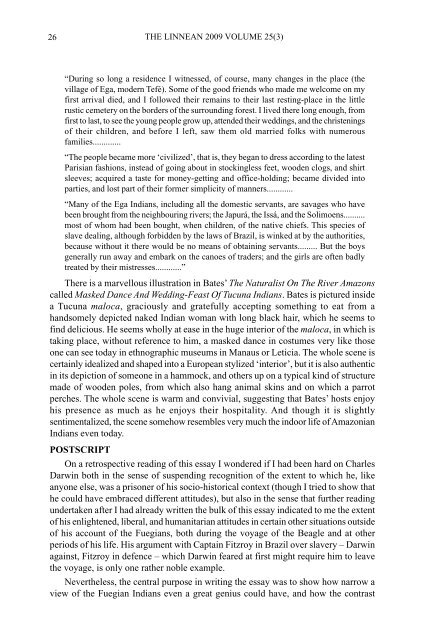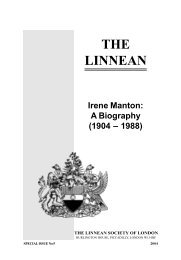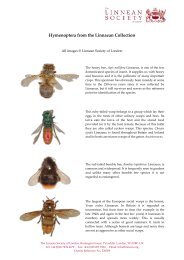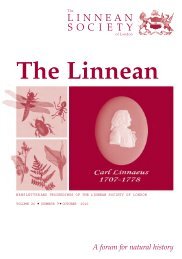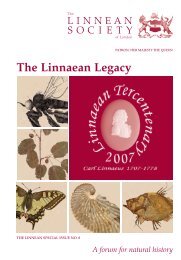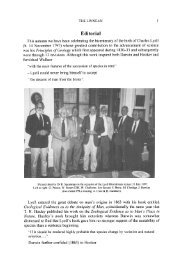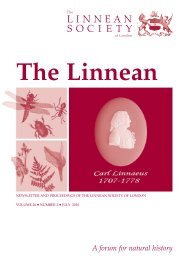Vol 25, no 3, October - The Linnean Society of London
Vol 25, no 3, October - The Linnean Society of London
Vol 25, no 3, October - The Linnean Society of London
You also want an ePaper? Increase the reach of your titles
YUMPU automatically turns print PDFs into web optimized ePapers that Google loves.
26<br />
THE LINNEAN 2009 VOLUME <strong>25</strong>(3)<br />
“During so long a residence I witnessed, <strong>of</strong> course, many changes in the place (the<br />
village <strong>of</strong> Ega, modern Tefé). Some <strong>of</strong> the good friends who made me welcome on my<br />
first arrival died, and I followed their remains to their last resting-place in the little<br />
rustic cemetery on the borders <strong>of</strong> the surrounding forest. I lived there long e<strong>no</strong>ugh, from<br />
first to last, to see the young people grow up, attended their weddings, and the christenings<br />
<strong>of</strong> their children, and before I left, saw them old married folks with numerous<br />
families.............<br />
“<strong>The</strong> people became more ‘civilized’, that is, they began to dress according to the latest<br />
Parisian fashions, instead <strong>of</strong> going about in stockingless feet, wooden clogs, and shirt<br />
sleeves; acquired a taste for money-getting and <strong>of</strong>fice-holding; became divided into<br />
parties, and lost part <strong>of</strong> their former simplicity <strong>of</strong> manners............<br />
“Many <strong>of</strong> the Ega Indians, including all the domestic servants, are savages who have<br />
been brought from the neighbouring rivers; the Japurá, the Issá, and the Solimoens..........<br />
most <strong>of</strong> whom had been bought, when children, <strong>of</strong> the native chiefs. This species <strong>of</strong><br />
slave dealing, although forbidden by the laws <strong>of</strong> Brazil, is winked at by the authorities,<br />
because without it there would be <strong>no</strong> means <strong>of</strong> obtaining servants......... But the boys<br />
generally run away and embark on the ca<strong>no</strong>es <strong>of</strong> traders; and the girls are <strong>of</strong>ten badly<br />
treated by their mistresses............”<br />
<strong>The</strong>re is a marvellous illustration in Bates’ <strong>The</strong> Naturalist On <strong>The</strong> River Amazons<br />
called Masked Dance And Wedding-Feast Of Tucuna Indians. Bates is pictured inside<br />
a Tucuna maloca, graciously and gratefully accepting something to eat from a<br />
handsomely depicted naked Indian woman with long black hair, which he seems to<br />
find delicious. He seems wholly at ease in the huge interior <strong>of</strong> the maloca, in which is<br />
taking place, without reference to him, a masked dance in costumes very like those<br />
one can see today in eth<strong>no</strong>graphic museums in Manaus or Leticia. <strong>The</strong> whole scene is<br />
certainly idealized and shaped into a European stylized ‘interior’, but it is also authentic<br />
in its depiction <strong>of</strong> someone in a hammock, and others up on a typical kind <strong>of</strong> structure<br />
made <strong>of</strong> wooden poles, from which also hang animal skins and on which a parrot<br />
perches. <strong>The</strong> whole scene is warm and convivial, suggesting that Bates’ hosts enjoy<br />
his presence as much as he enjoys their hospitality. And though it is slightly<br />
sentimentalized, the scene somehow resembles very much the indoor life <strong>of</strong> Amazonian<br />
Indians even today.<br />
POSTSCRIPT<br />
On a retrospective reading <strong>of</strong> this essay I wondered if I had been hard on Charles<br />
Darwin both in the sense <strong>of</strong> suspending recognition <strong>of</strong> the extent to which he, like<br />
anyone else, was a prisoner <strong>of</strong> his socio-historical context (though I tried to show that<br />
he could have embraced different attitudes), but also in the sense that further reading<br />
undertaken after I had already written the bulk <strong>of</strong> this essay indicated to me the extent<br />
<strong>of</strong> his enlightened, liberal, and humanitarian attitudes in certain other situations outside<br />
<strong>of</strong> his account <strong>of</strong> the Fuegians, both during the voyage <strong>of</strong> the Beagle and at other<br />
periods <strong>of</strong> his life. His argument with Captain Fitzroy in Brazil over slavery – Darwin<br />
against, Fitzroy in defence – which Darwin feared at first might require him to leave<br />
the voyage, is only one rather <strong>no</strong>ble example.<br />
Nevertheless, the central purpose in writing the essay was to show how narrow a<br />
view <strong>of</strong> the Fuegian Indians even a great genius could have, and how the contrast


